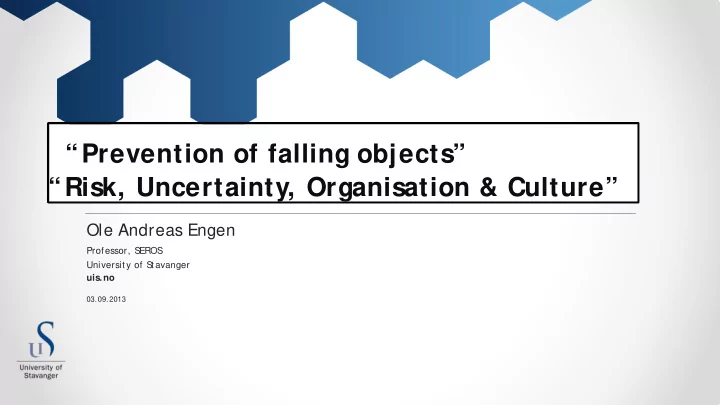

“Prevention of falling objects” “Risk, Uncertainty, Organisation & Culture” Ole Andreas Engen Professor, SEROS University of Stavanger uis.no 03.09.2013
Objectives This lecture will place organisational events, incidents and accidents – such as falling obj ects - in a conceptual and theoretical context This implies to discuss basic concepts of risk, uncertainty and organisational challenges handling such phenomena It also implies to discuss what organisational barriers that exist in order to reduce risk and reduce uncertainties associated with events such as falling obj ects Finally, from theory to practise i.e. suggesting some practical implications. 2
What is risk Risk is probabilities X consequences Risk is equal to the two dimensional combination of events/ consequences and associated uncertainties Risk refers to uncertainty about, and severity of the consequences with respect to something humans value What definition of risk that is applicable or relevant depends on how much we know about the event, the context of the event and the degree of uncertainty. 3
The Concept of Risk Analytical concept Risk Uncertainty Complexity Ambiguity Epistemic: Aleatoric: Interpretative: Normative: Basic lack of variability the relevance, The values to represented by knowledge meaning and be protected about distribution implications of and the possible values fundamental the basis for the priorities to be parametres e.g. e.g. roll of a fair decision making made 4 climate change dice
What are organisational accidents? Often catastrophic events that occur in a complex technological and organisational setting The necessary condition for an organisational accident is the rare conj uction of a set of holes in succesive defences, allowing to come into damaging contact with people and assets An accident traj ectory passing through corresponding holes in the layers of defences, barriers and safeguards. Concepts: Active failures, latent conditions. It is an organisational goal to mobilise resources in order to reduce risk for such events to occur. 5
The Risk Thermostat Money, power, love, glory, food, Propensities of sex, rushes of Reward risk adrenaline, control ... Balancing behaviour Money, health, life, status, Events, Risk self-esteem, incidents, perception embarrassment, accidents j ail, loss of control ... 6
Organisational accident and incidents 7
PROBLEM PROBLEM IMPLEMENT NEW MORE DRAW ON BRING IN EFFECTIVE DRAW UPON DEVELOP AND PAST NEW SOLUTION PAST IMPLEMENT EXPERIENCE KNOWLEDGE EXPERIENCE SOLUTION (a) Single Loop Learning (b) Double Loop Learning 8
«Engineering a safety culture» Informed Culture Reporting Just Flexible Culture Culture Culture Learning Culture 9
Safety culture Behaviour based Culturally embedded - Top down - Bottom up - Focus on interaction & groups - Frontline employees - Unveil the fundamental values - Focus on activities of the organisations - Individual measure - Change management - Provide support - Understand conditions for - Continous improvement compliance 10
Organisational typologies Pathological Bureaucratic Generative Don’ t want to know May not find out Actively seek it Messengers «are shot» Messengers are Messengers are listened to if they trained and rewarded arrived Responsibility is Responsibility is Responsibility is shirked compartmentalized shared Failure is punished or Failures lead to local Failures lead to far concealed repairs reaching reforms New ideas are actively New ideas often New ideas are discouraged present problems welcomed 11
Experiences from the industry: Investigation, measures and learning • S carce and rigid timelimits for investigations. • Lacking routines for spreading of knowledge from investigations • Overproduction of measures. (” Tiltakstretthet” ) • ” Incident-investigation-order-measures-incident..» creates stress and noise in the organisation. 12
Power and learning • Learning requires openness, sincerity and honesty. • The ability to learn is weakened by struggles between different social groups i.e.management and unions, and between the unions and other stakeholders within complex organisational systems • Incidents are used to gain power and influence. Creates noise and a resulting lack in the capacity to handle HS E. It also disturbs abilities of compliance 13
Power & learning S trong beliefs in systems and regulations among upper management Excessive belief in systems may produse overspesialisation and increased organisational complexity Result: increased gap between procedures and practice We find signs of these types of developments in the industry 14
Risk, Uncertainty and Organisational Accidents How to develop correct risk perceptions & understanding How to make organsiational arrangements in order to deal with uncertainty How to reduce number of unsafe acts, active failures and latent conditions What organisational barriers exist when it comes to establishing effective risk management, leadership and compliance and engineering a robust safety culture. 15
Identified challenges Improvement areas Management system Complexity Decision making Competence/staffing Criticism Power Management perspective Investigation and Power relations measures Investigation Means for Systems for knowledge knowledge sharing sharing Managing Interface towards the organisational suppliers interface New technology and organisational adaption 16
Combining risk descriptions with managerial and organisational efforts Risk in organisations - requires individual identifications Risk in organisations - requires organisational slack & redundancy Risk in organisations- requires an «open safety culture» freed from patolhogical traits Risk in organisations- requires an organisational culture characterised by balanced power relations and trust between the different groups. 17
Risk and organisational precautionary principles The level of uncertainty will challenge the work of developing and implementing organisational precautionary principles The degree of organisational precautionary principles has to balance with principles of cost efficiency Developing precautionary principles handling risk is also to establish organisational principles for double loop learning 18
Thank You! Hopefully not the practise!!!! 19
Recommend
More recommend